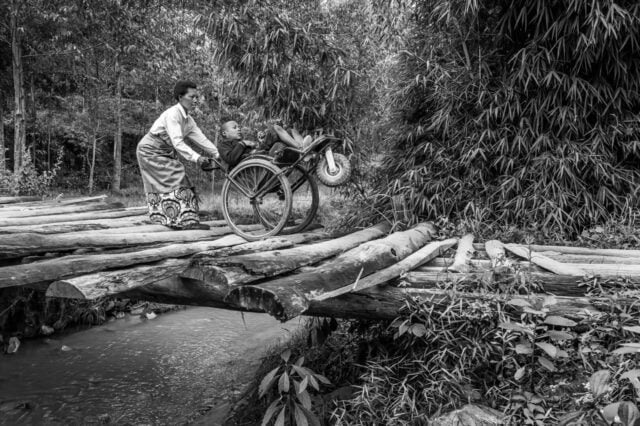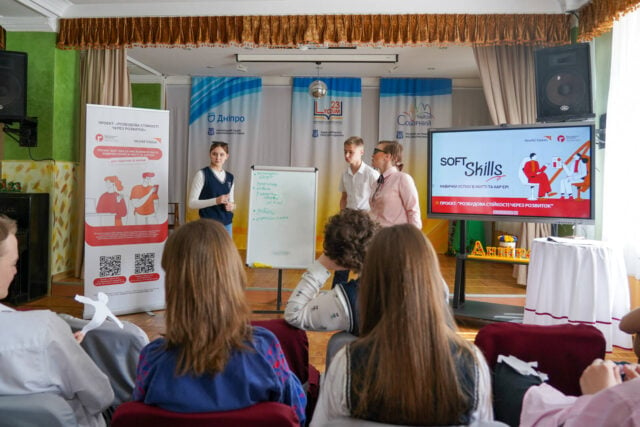Each day, millions of girls around the world can’t step into a classroom. Some need to take care of younger siblings. Some must collect water and do other household chores. Some live in communities where education for girls is still not valued. Neglect, abuse, and poverty create seemingly insurmountable barriers to their education, resulting in about 496 million women who can’t read and write today.
World Vision works in nearly 100 countries to help girls overcome these barriers so they can attend school, improve their lives, and help advance their communities. Travel around the globe through 11 photos to see how World Vision has helped girls overcome the obstacles they face to education.
![Eight-year-old Jouri still has her report card from when she attended school in Syria — before she and her family had to flee because bombs dropped close to their home. Now they live as refugees in Lebanon. Jouri loves school and will do whatever it takes to continue her education. "When we first came to Lebanon, I started nagging over and over on my dad to register me in school, but he kept on telling me there is no place for me,” she says. World Vision launched education programs for Syrian refugee children to help them catch up what they’ve missed from being out of school and prepare them to attend formal schools when it’s possible. Jouri says, "Coming here [to World Vision's educational project] is the best thing that happened to me since we [left Syria].”](https://wvusstatic.com/www/uploads/2017/05/OTG-Email-Hero-Early-6-Ed-Overcome-11-Syria-D220-0131-02_398983-crop.jpg) Eight-year-old Jouri still has her report card from when she attended school in Syria — before she and her family had to flee because bombs dropped close to their home. Now they live as refugees in Lebanon. Jouri loves school and will do whatever it takes to continue her education. “When we first came to Lebanon, I started nagging over and over on my dad to register me in school, but he kept on telling me there is no place for me,” she says. World Vision launched education programs for Syrian refugee children to help them catch up on what they’ve missed from being out of school and prepare them to attend formal schools when it’s possible. Jouri says, “Coming here [to World Vision’s educational project] is the best thing that happened to me since we [left Syria].”
Eight-year-old Jouri still has her report card from when she attended school in Syria — before she and her family had to flee because bombs dropped close to their home. Now they live as refugees in Lebanon. Jouri loves school and will do whatever it takes to continue her education. “When we first came to Lebanon, I started nagging over and over on my dad to register me in school, but he kept on telling me there is no place for me,” she says. World Vision launched education programs for Syrian refugee children to help them catch up on what they’ve missed from being out of school and prepare them to attend formal schools when it’s possible. Jouri says, “Coming here [to World Vision’s educational project] is the best thing that happened to me since we [left Syria].”
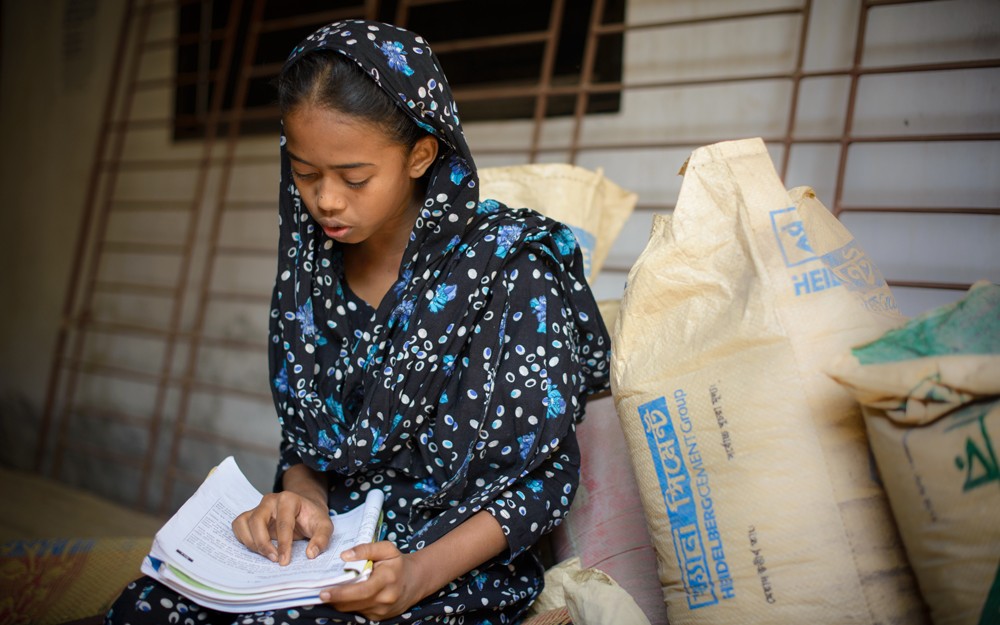 Bithi Aktar, 13, graduated from a World Vision education program for children living on the streets in Dhaka Shishu, Bangladesh. Bithi’s father had an accident that left him disabled a decade ago, leaving her mother to provide for the family. She worked with her mother as a housekeeper to help and looked after her siblings, leaving no time for school. Though she still works, Bithi also attends school and is in the fifth grade. “I want to be a medical doctor,” she says. “I want to serve poor children, so they won’t have the experiences I had.”
Bithi Aktar, 13, graduated from a World Vision education program for children living on the streets in Dhaka Shishu, Bangladesh. Bithi’s father had an accident that left him disabled a decade ago, leaving her mother to provide for the family. She worked with her mother as a housekeeper to help and looked after her siblings, leaving no time for school. Though she still works, Bithi also attends school and is in the fifth grade. “I want to be a medical doctor,” she says. “I want to serve poor children, so they won’t have the experiences I had.”
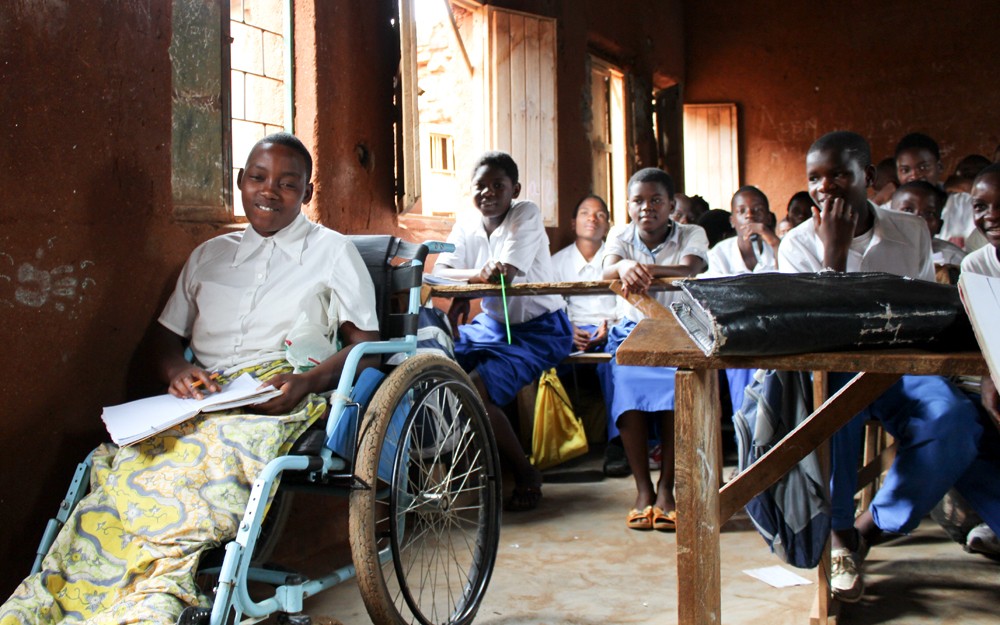 In Burundi, 16-year-old Jocelyn Ndikumana lost the use of her legs when she contracted polio at age 4. She also lost her parents, who rejected her because of her new disability. Her older sister cared for her, but didn’t want to send Jocelyn to school, despite her strong desire to learn. A neighbor took pity and helped Jocelyn find a local center for people with disabilities, which had partnered with World Vision and provided 100 children, including Jocelyn, with wheelchairs. While now in school, she doesn’t have any friends and still struggles with paying her fees, often receiving help from fellow church members and even the school director. Despite the setbacks, Jocelyn lights up when she talks about her determination to get an education. “I want to be a headmistress, if I get a chance to finish my studies,” she says. “I need a job where I will work sitting; my legs do not allow me to stand or move easily.”
In Burundi, 16-year-old Jocelyn Ndikumana lost the use of her legs when she contracted polio at age 4. She also lost her parents, who rejected her because of her new disability. Her older sister cared for her, but didn’t want to send Jocelyn to school, despite her strong desire to learn. A neighbor took pity and helped Jocelyn find a local center for people with disabilities, which had partnered with World Vision and provided 100 children, including Jocelyn, with wheelchairs. While now in school, she doesn’t have any friends and still struggles with paying her fees, often receiving help from fellow church members and even the school director. Despite the setbacks, Jocelyn lights up when she talks about her determination to get an education. “I want to be a headmistress, if I get a chance to finish my studies,” she says. “I need a job where I will work sitting; my legs do not allow me to stand or move easily.”
![Dira, left, encourages her 12-year-old sister, Phinat, right, in her studies. Dira is the sixth of eight children and had to leave school in the second grade so she could scavenge for junk to help her family earn money after her father died. Later, with World Vision’s help, she got nonformal education and vocational training and now runs a hairdresser shop in her town of Battambang, Cambodia. Because of her experience, she wants her younger siblings to have a different life, including Phinat. “I want them to study until [they] finish class,” she says. “I don’t want Phinat to scavenge because she is too young. Scavengers face risk, such as rape and traffic accidents.” Phinat has the second-highest grades in her class of 30 students. “My older sister encourages me to study hard,” Phinat says. “She doesn’t allow me to pick up junk.”](https://wvusstatic.com/www/uploads/2017/04/OTG-Email-Hero-Early-6-Ed-Overcome-3-Cambodia-D055-0763-31_419222-crop.jpg) Dira, left, encourages her 12-year-old sister, Phinat, right, in her studies. Dira is the sixth of eight children and had to leave school in the second grade so she could scavenge for junk to help her family earn money after her father died. Later, with World Vision’s help, she got nonformal education and vocational training and now runs a hairdresser shop in her town of Battambang, Cambodia. Because of her experience, she wants her younger siblings to have a different life, including Phinat. “I want them to study until [they] finish class,” she says. “I don’t want Phinat to scavenge because she is too young. Scavengers face risk, such as rape and traffic accidents.” Phinat has the second-highest grades in her class of 30 students. “My older sister encourages me to study hard,” Phinat says. “She doesn’t allow me to pick up junk.”
Dira, left, encourages her 12-year-old sister, Phinat, right, in her studies. Dira is the sixth of eight children and had to leave school in the second grade so she could scavenge for junk to help her family earn money after her father died. Later, with World Vision’s help, she got nonformal education and vocational training and now runs a hairdresser shop in her town of Battambang, Cambodia. Because of her experience, she wants her younger siblings to have a different life, including Phinat. “I want them to study until [they] finish class,” she says. “I don’t want Phinat to scavenge because she is too young. Scavengers face risk, such as rape and traffic accidents.” Phinat has the second-highest grades in her class of 30 students. “My older sister encourages me to study hard,” Phinat says. “She doesn’t allow me to pick up junk.”
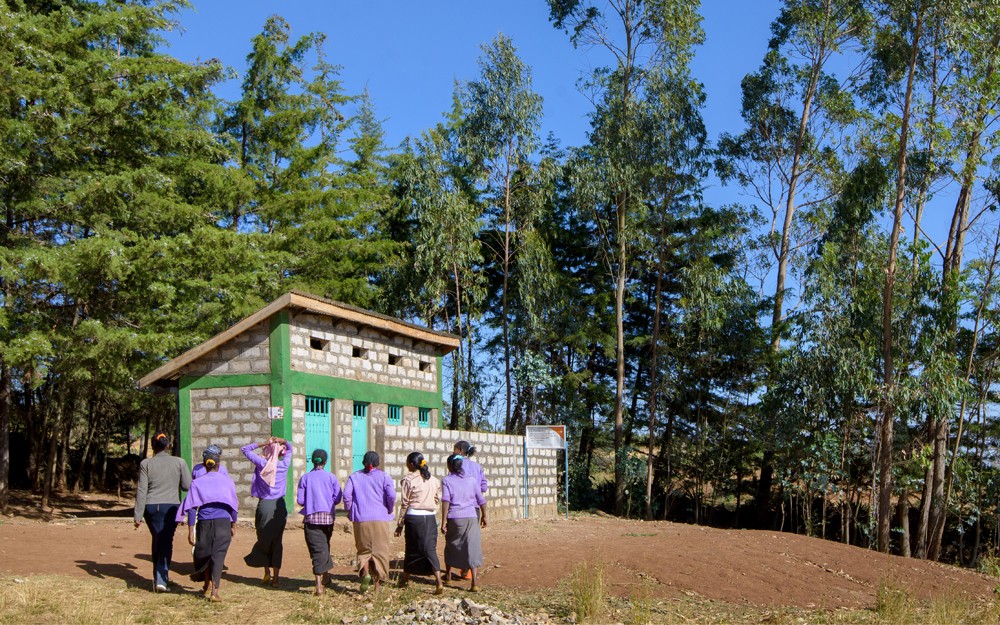 At Kurfo Gute School in Wonchi, Ethiopia, girls no longer miss several days of school each month. The school grounds used to be littered with feces, as it was an open defecation zone; school children would relieve themselves wherever they pleased. Girls tried to find a place in the forest, but during their menstrual cycles they didn’t come to school. They missed three to five school days every month — as many as 60 days a year — due to a lack of sanitation facilities in their school. World Vision helped, and now with latrines, training, and appropriate water, sanitation, and hygiene programs for the children, attendance rates and grades have both soared.
At Kurfo Gute School in Wonchi, Ethiopia, girls no longer miss several days of school each month. The school grounds used to be littered with feces, as it was an open defecation zone; school children would relieve themselves wherever they pleased. Girls tried to find a place in the forest, but during their menstrual cycles they didn’t come to school. They missed three to five school days every month — as many as 60 days a year — due to a lack of sanitation facilities in their school. World Vision helped, and now with latrines, training, and appropriate water, sanitation, and hygiene programs for the children, attendance rates and grades have both soared.
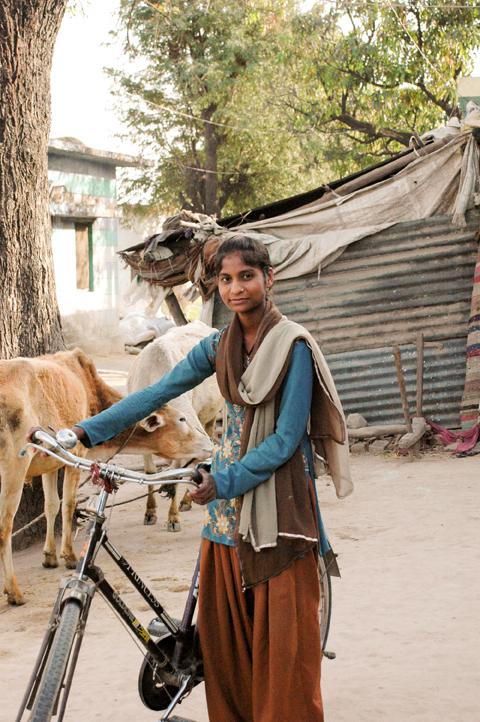 Pushpa’s parents are day laborers in the northern Indian village of Luthapur, and they struggle to provide for their five children. As the eldest, Pushpa, 15, often had to work the fields with her parents to supplement the family income. Soon, attending school became difficult. “Walking the six kilometers (3.7 miles) took me almost an hour, and I was late most of the time,” she says. Pushpa agreed to drop out of school, as she was missing too many classes. A World Vision staff member saw the problem, talked to Pushpa’s parents, and provided her and 16 other girls with bicycles so they could get to school quickly and safely. “Now, with my bicycle, my friends and I reach school in about 20 minutes. I also have time to help my mother with domestic work after I come back from school,” Pushpa says. She helps her mother in the fields during her school breaks.
Pushpa’s parents are day laborers in the northern Indian village of Luthapur, and they struggle to provide for their five children. As the eldest, Pushpa, 15, often had to work the fields with her parents to supplement the family income. Soon, attending school became difficult. “Walking the six kilometers (3.7 miles) took me almost an hour, and I was late most of the time,” she says. Pushpa agreed to drop out of school, as she was missing too many classes. A World Vision staff member saw the problem, talked to Pushpa’s parents, and provided her and 16 other girls with bicycles so they could get to school quickly and safely. “Now, with my bicycle, my friends and I reach school in about 20 minutes. I also have time to help my mother with domestic work after I come back from school,” Pushpa says. She helps her mother in the fields during her school breaks.
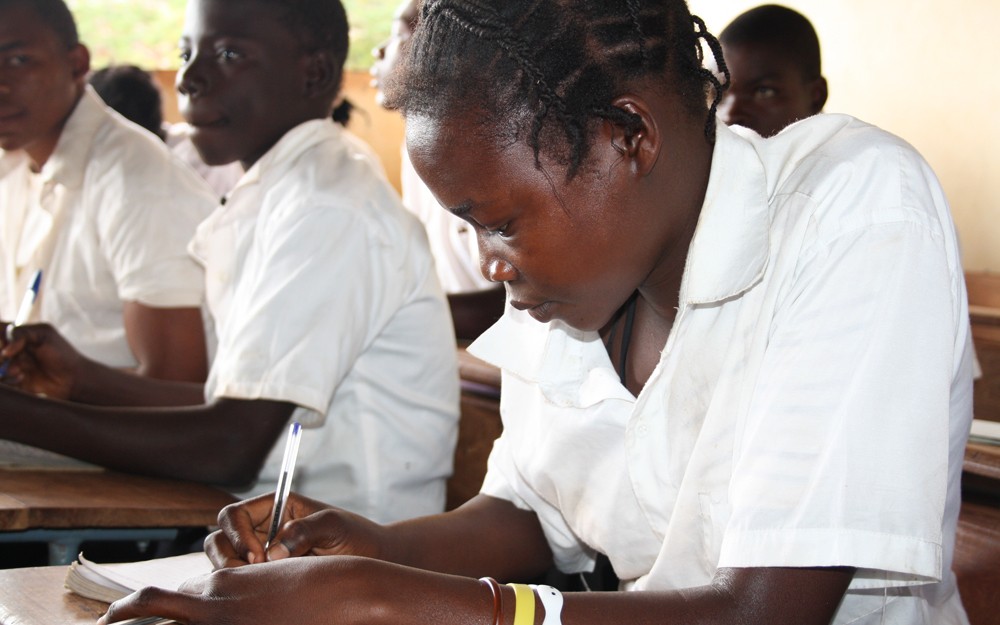 Beatriz Cebola, 14, lost her parents a year ago, and an aunt took her in. But her aunt struggled to provide for her, so she decided Beatriz needed to marry instead of attend school. Refusing to accept this fate, Beatriz sought help at a World Vision club she had attended for two years in her hometown in Mozambique — she had helped others but now needed help herself. “I trusted them,” she says. “I knew that was the right place to go.” Through the help of the club and the local World Vision program manager, they secured a trial for Beatriz’s aunt and the man Beatriz was to marry. The verdict came: Beatriz would not marry the man, or else the family would face a penalty. “I felt like I had awakened from the worst nightmare,” Beatriz says. “If I had married, this time, probably, I would be pregnant and out of school, just like what happens to a lot of girls in our community.” Now she is excited about her future. “I want to be a teacher,” she says. “I want to educate other children, just the way I am being educated.”
Beatriz Cebola, 14, lost her parents a year ago, and an aunt took her in. But her aunt struggled to provide for her, so she decided Beatriz needed to marry instead of attend school. Refusing to accept this fate, Beatriz sought help at a World Vision club she had attended for two years in her hometown in Mozambique — she had helped others but now needed help herself. “I trusted them,” she says. “I knew that was the right place to go.” Through the help of the club and the local World Vision program manager, they secured a trial for Beatriz’s aunt and the man Beatriz was to marry. The verdict came: Beatriz would not marry the man, or else the family would face a penalty. “I felt like I had awakened from the worst nightmare,” Beatriz says. “If I had married, this time, probably, I would be pregnant and out of school, just like what happens to a lot of girls in our community.” Now she is excited about her future. “I want to be a teacher,” she says. “I want to educate other children, just the way I am being educated.”
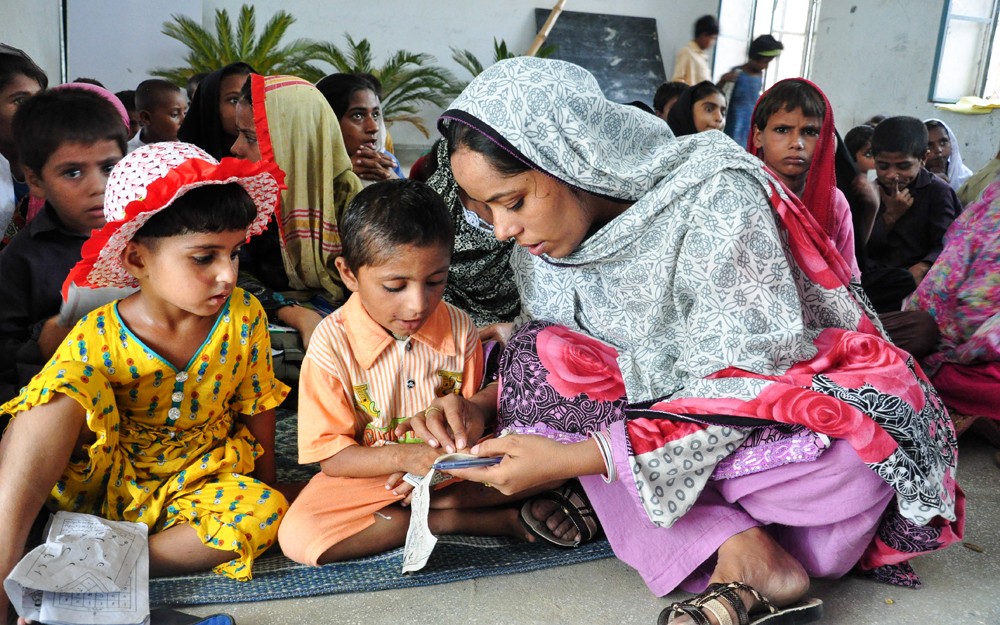 According to the education policy in the Muzaffargarh district of Pakistan, one teacher shouldn’t have more than 40 students, but most do — one teacher even had more than 180 students. To help, World Vision trained 41 substitute teachers, 12 of whom are women, to work with teachers. Shahnzah, right, is one of those substitutes. She became the first girl in her village to graduate from college when she earned her education degree, and she wants to see more change. “I always prayed to God to give me the chance to serve the children,” she says. “Now, I am teaching innocent children in school.” Shahnzah’s success shows how educating girls creates change in a community. She has set an ambitious goal of achieving a 100% literacy rate in her area. She started by finding out how many children are out of school and has already persuaded many parents to send their children to school.
According to the education policy in the Muzaffargarh district of Pakistan, one teacher shouldn’t have more than 40 students, but most do — one teacher even had more than 180 students. To help, World Vision trained 41 substitute teachers, 12 of whom are women, to work with teachers. Shahnzah, right, is one of those substitutes. She became the first girl in her village to graduate from college when she earned her education degree, and she wants to see more change. “I always prayed to God to give me the chance to serve the children,” she says. “Now, I am teaching innocent children in school.” Shahnzah’s success shows how educating girls creates change in a community. She has set an ambitious goal of achieving a 100% literacy rate in her area. She started by finding out how many children are out of school and has already persuaded many parents to send their children to school.
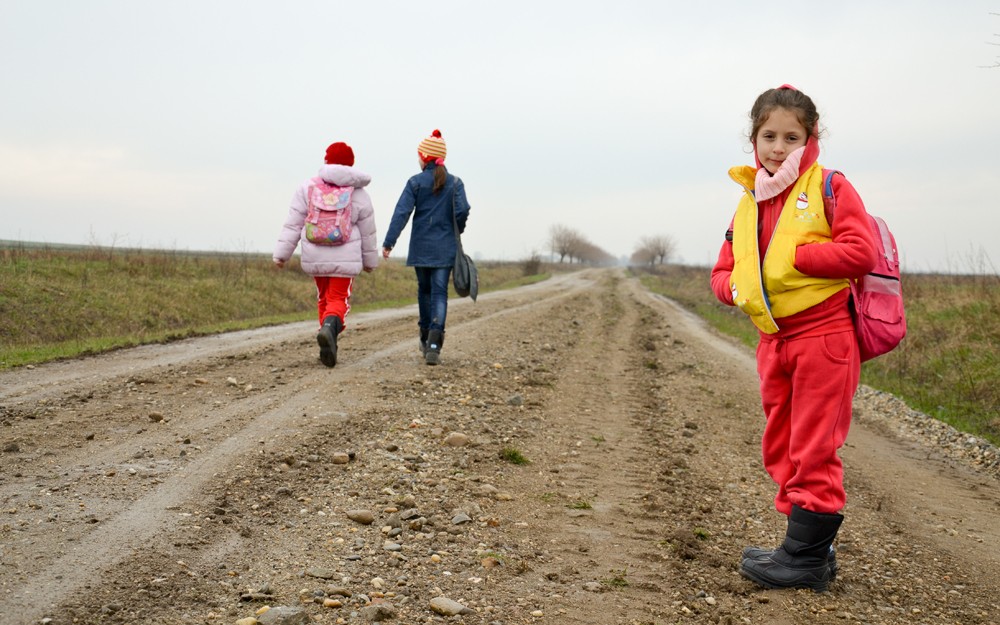 Raluca, 7, right, is one of only 25 children who live in Mosna, Romania. The children attend school in the next village over, but when it rains or snows, the unpaved road becomes impassable. Because the school bus can’t reach them, she and the other children have to walk almost 5 miles to get to their classes. A World Vision donation of winter boots brought the children comfort for their long walk — and brings comfort to their families, as it’s one less concern for parents.
Raluca, 7, right, is one of only 25 children who live in Mosna, Romania. The children attend school in the next village over, but when it rains or snows, the unpaved road becomes impassable. Because the school bus can’t reach them, she and the other children have to walk almost 5 miles to get to their classes. A World Vision donation of winter boots brought the children comfort for their long walk — and brings comfort to their families, as it’s one less concern for parents.
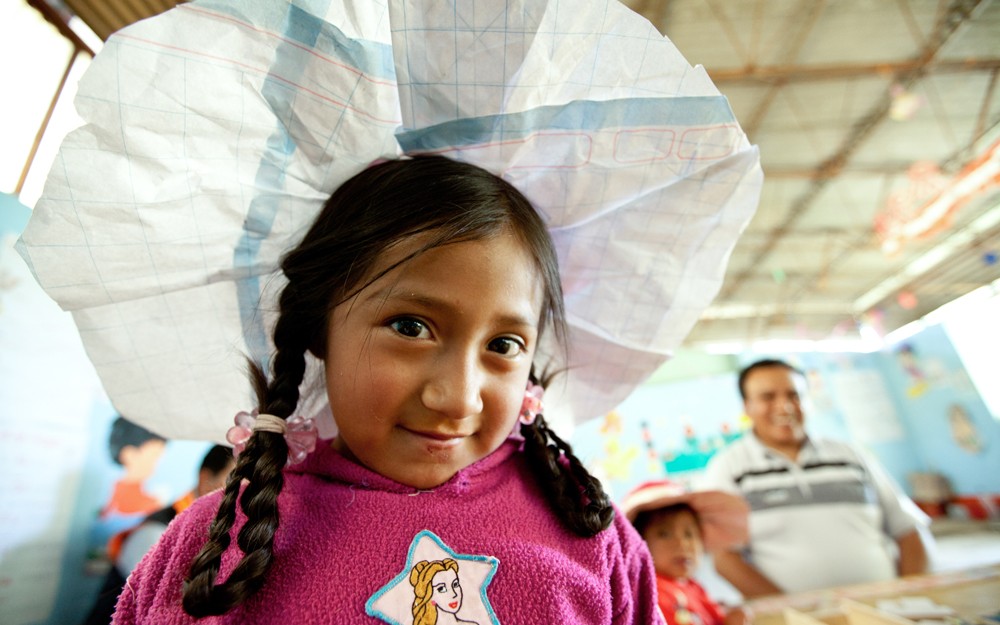 Carol Tatiana Ramos Ramirez, 5, attends a nonformal preschool in Tambo, southern Peru. Many children in the countryside attend such early education centers because they don’t have birth certificates, which are needed to enroll in government schools. In preschools like this one, teachers are volunteers who receive a small government stipend every month. This preschool received World Vision assistance thanks to a gift from a child sponsor, which will help improve the building’s security and provide new learning games and toys.
Carol Tatiana Ramos Ramirez, 5, attends a nonformal preschool in Tambo, southern Peru. Many children in the countryside attend such early education centers because they don’t have birth certificates, which are needed to enroll in government schools. In preschools like this one, teachers are volunteers who receive a small government stipend every month. This preschool received World Vision assistance thanks to a gift from a child sponsor, which will help improve the building’s security and provide new learning games and toys.
![Dira, left, encourages her 12-year-old sister, Phinat, right, in her studies. Dira is the sixth of eight children and had to leave school in the second grade so she could scavenge for junk to help her family earn money after her father died. Later, with World Vision’s help, she got nonformal education and vocational training and now runs a hairdresser shop in her town of Battambang, Cambodia. Because of her experience, she wants her younger siblings to have a different life, including Phinat. “I want them to study until [they] finish class,” she says. “I don’t want Phinat to scavenge because she is too young. Scavengers face risk, such as rape and traffic accidents.” Phinat has the second-highest grades in her class of 30 students. “My older sister encourages me to study hard,” Phinat says. “She doesn’t allow me to pick up junk.”](https://wvusstatic.com/www/uploads/2017/04/OTG-Email-Hero-Early-6-Ed-Overcome-3-Cambodia-D055-0763-31_419222-crop-850x531.jpg)
